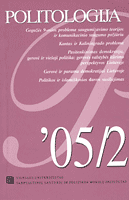Dėl Lietuvos socialinės politikos modelio
Regarding the Issue of the Lithuanian Social Policy Model
Author(s): Arvydas GuogisSubject(s): Politics / Political Sciences
Published by: Vilniaus universiteto leidykla & VU Tarptautinių santykių ir politikos mokslų institutas
Keywords: Lithuania's social policy and social care; Lithuania's social policy model; Scandinavian-type of social security model; Bismarckian corporative model of social security; the liberal marginal model of social security
Summary/Abstract: This article represents one of the few attempts to conceptualise Lithuania's social policy and social care. It aims to define Lithuania's social policy model. In this article one may find an answer to the question why Lithuania rejected the option of creating the Scandinavian-type of social security model based on the principles of universality. This article has been divided in the following chapters: 1) The role of modelling in social sciences; 2) East European social policy model; 3) Lithuania's social policy model. The meaning of modelling in today's social sciences has been underestimated so far, - it is said. Despite the intensified processes of globalisation, cultural nivelation and the impact of the cultural relativism, it is difficult to expect that social sciences will stand aside from the opportunities provided by the traditional modelling. However, the information society age presents us with a new challenge, - we have to look for the new methods of modelling. The modelling of the social policy and social administration is known for its original material that demands specific "processing". As far as the methodology of social administration is concerned, it is to a large extent underanalysed. In conclusion in author says that generally, the social policy model of Lithuania conforms to the Eastern European model, which may be defined either as a post-communist conservative-corporative model, or liberal, or an intermediate between these two types. However, the Lithuanian model has certain specific features. (...)
Journal: Politologija
- Issue Year: 2002
- Issue No: 4 (28)
- Page Range: 75-94
- Page Count: 20
- Language: Lithuanian

